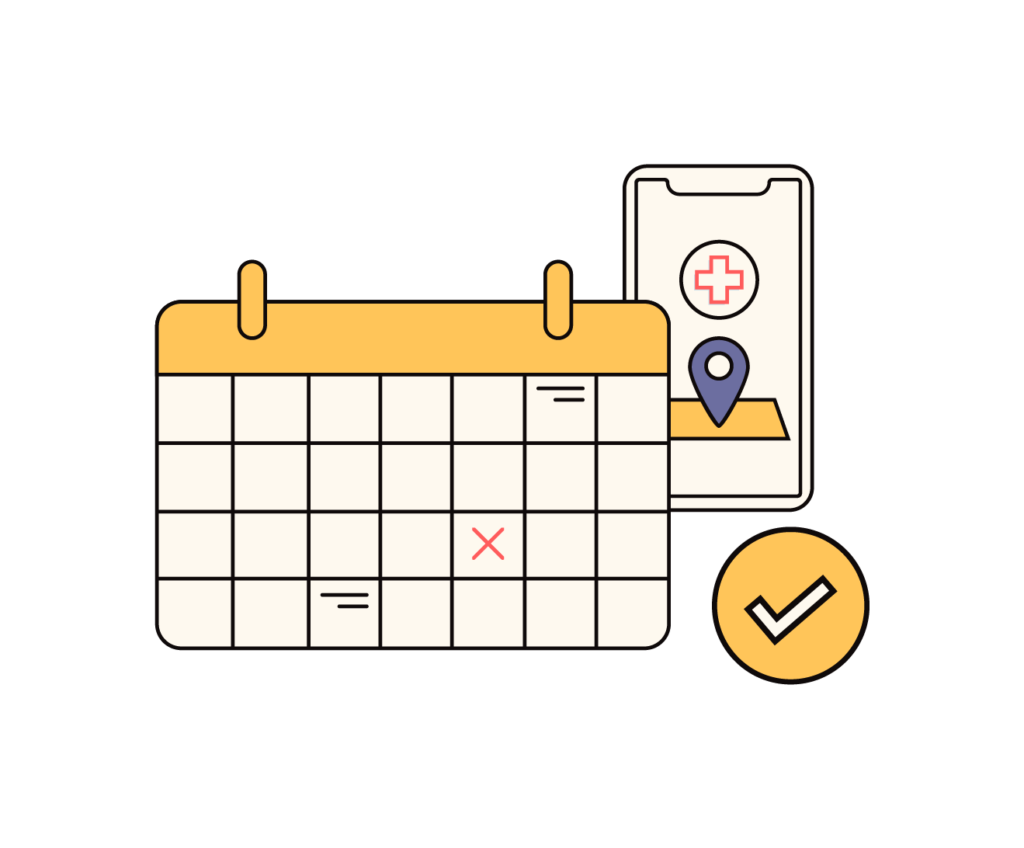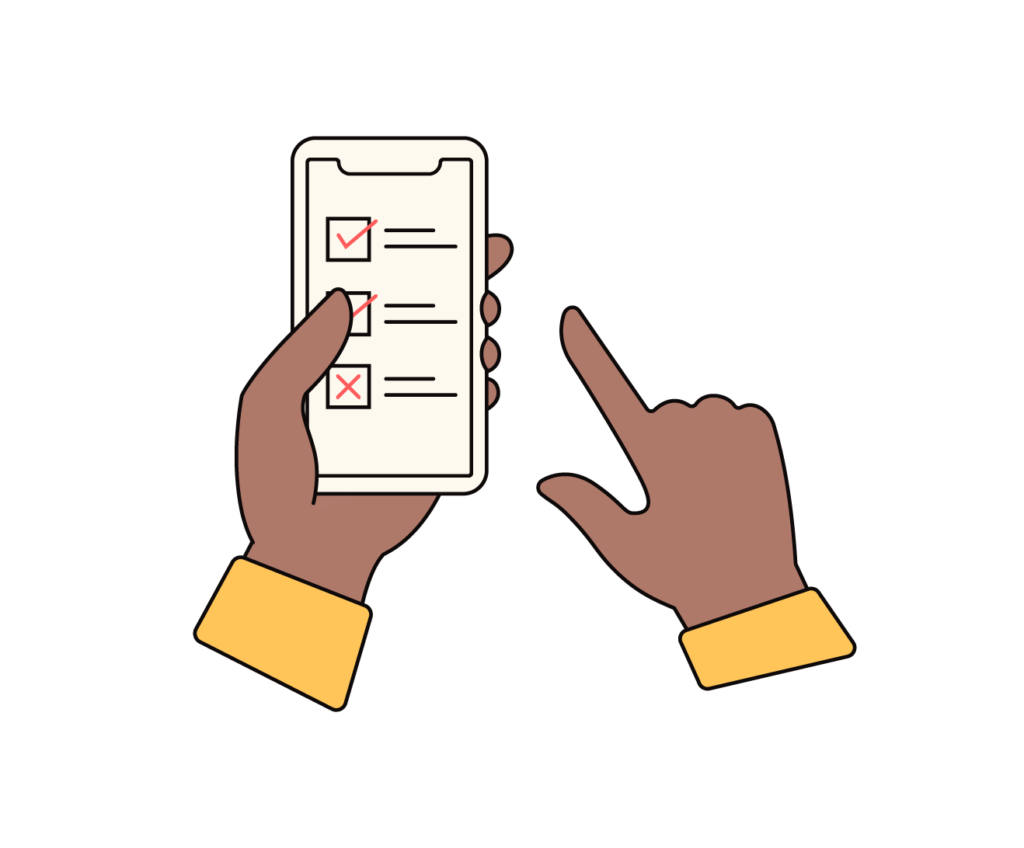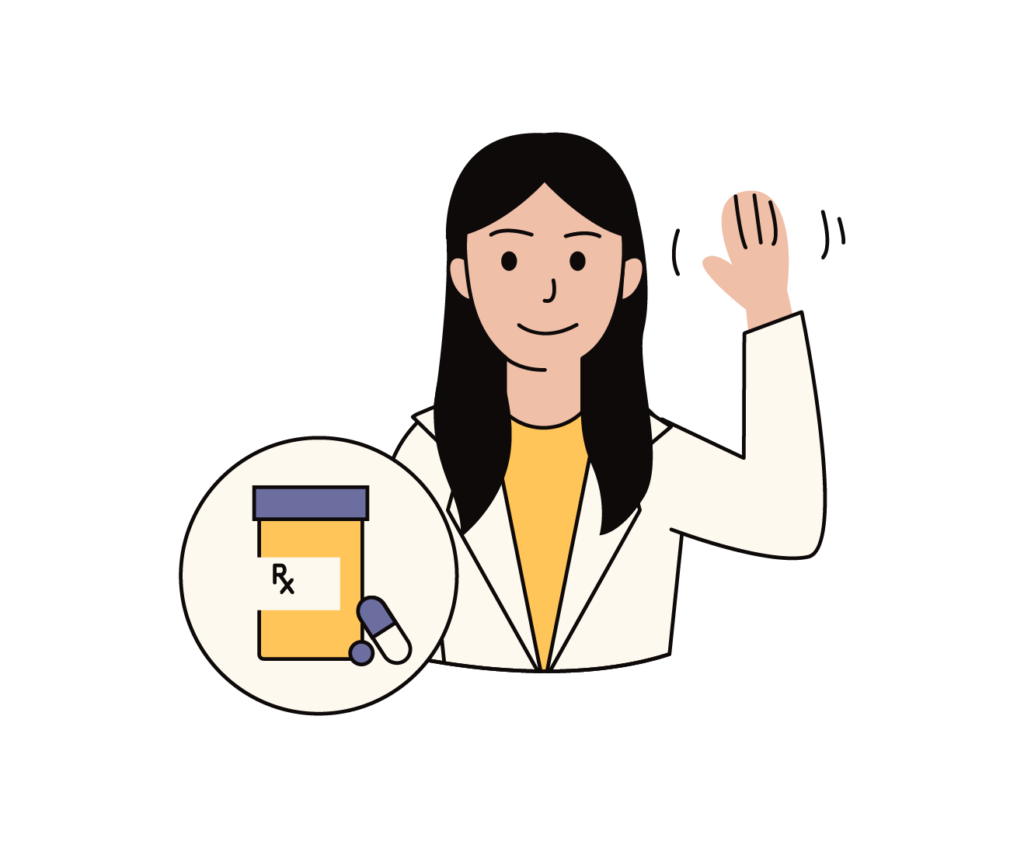Your pharmacy can now help you manage your health, and if eligible, write a new prescription for common conditions.
Instead of visiting a primary care provider, get help at the pharmacy in minutes.
It’s always affordable, even without insurance.
What is a wellness check?
A wellness check for chronic conditions is a comprehensive assessment of your health if you have a chronic condition such as diabetes, high blood pressure, or asthma/COPD. It includes a review of your medical history, a physical exam, and blood tests. The purpose of a wellness check for chronic conditions is to identify any potential problems with your condition so that they can be addressed early.
What to expect
During a wellness check for chronic conditions, your doctor will ask you about your medical history, including your family history of your chronic condition. They will also perform a physical exam, which may include checking your blood pressure, pulse, weight, breathing, heart rate, and oxygen levels. You will also have blood tests to check your blood sugar levels, cholesterol levels, kidney function, and lung function.
Why it’s important
A wellness check for chronic conditions is important because it can help you to identify any potential problems with your condition early. This means that you can take steps to address these problems before they become serious. For example, if your blood sugar levels are too high, your doctor may prescribe medication to help you control your blood sugar.
How often you should get a wellness check for chronic conditions?
The frequency of your wellness checks for chronic conditions will depend on your individual circumstances. However, most people with chronic conditions should get a wellness check at least once a year.
What is birth control?
Prescription birth control is most commonly used as a method to prevent pregnancy. However, there are other reasons that someone may use birth control, including treatment of gynecological conditions, such as endometriosis. Severe hormonal acne, very heavy and painful periods, and migraines associated with periods may also be reasons that birth control is used.
Getting access to hormonal birth control via the pharmacy is often one of easiest ways for people to access cheap birth control.
What you should know
Our platform guides pharmacists to look at the answers you provide to our self-assessment questions to decide if you qualify to receive an emergency anaphylaxis medication.
We use evidence based guidelines and protocols to ask you the right questions that will assess whether it’s safe for your pharmacist to prescribe or if you should be referred to a doctor, nurse, or specialist.
Can I be seen through Scripted for birth control?
Most people can get birth control through Scripted.
Take a look at the eligibility summary below to see if you are a candidate or if you should be seen by a doctor:
Can be treated by a pharmacist:
Cannot be treated by a pharmacist:
I’m a nonbinary or transgender person. Can I get a new prescription for birth control at my pharmacy?
While we would love to offer birth control to all patients, medical regulations currently require us to refer trans patients seeking new birth control prescriptions to physicians specializing in trans healthcare. If you’ve already gotten an existing prescription, filling it should be no problem.
We apologize for the inconvenience — Scripted was built in part by trans and nonbinary staff, so we know difficulties accessing trans-friendly care can be frustrating. As soon as these regulations change, we’ll update our guidelines to welcome trans and nonbinary birth control patients.
What are cold sores?
Cold sores are small, fluid-filled lesions that form around the mouth or on the lips. The medical name for oral cold sores is ‘herpes labialis’. Cold sores can affect both men and women of any age, but the initial presentation typically occurs during childhood.
What you should know
Our platform guides pharmacists to look at the answers you provide to our self-assessment questions to decide if you have asthma that they can treat appropriately.
We use evidence based guidelines and protocols to ask you the right questions that will assess whether it’s safe for your pharmacist to prescribe or if you should be referred to a doctor, nurse, or specialist.
Can I be seen through Scripted for cold sores?
Common cold sore symptoms include:
What is acne?
Acne is a skin condition affecting people of all ages but is most common in teenagers and young adults. Acne is a broad term for a few different skin blemishes including blackheads, whiteheads, or pustules just to name a few. Acne may also be referred to as “pimples” or “zits”, which commonly appear on your face, but may also appear on your chest and back.
What you should know
Our platform guides pharmacists to look at the answers you provide to our self-assessment questions to decide if you qualify to receive an emergency anaphylaxis medication.
We use evidence based guidelines and protocols to ask you the right questions that will assess whether it’s safe for your pharmacist to prescribe or if you should be referred to a doctor, nurse, or specialist.
Can I be seen through Scripted for my acne?
Individuals who are at least 18 years of age and present with classic symptoms of mild acne may be seen through Scripted for acne treatment.
Take a look at the eligibility summary below to see if you are a candidate or if you should be seen by a doctor:
Can be treated by a pharmacist:
Cannot be treated by a pharmacist:
Common Acne Symptoms include:
What is Anaphylaxis?
Anaphylaxis is a severe and potentially life-threatening allergic reaction. Anaphylaxis typically occurs within minutes of exposure to the offending agent and must be treated right away.
What you should know
Our platform guides pharmacists to look at the answers you provide to our self-assessment questions to decide if you qualify to receive an emergency anaphylaxis medication.
We use evidence based guidelines and protocols to ask you the right questions that will assess whether it’s safe for your pharmacist to prescribe or if you should be referred to a doctor, nurse, or specialist.
Can I be seen through Scripted for my anaphylaxis?
Cannot be treated by a pharmacist:
What is Asthma?
Asthma is a chronic condition that causes inflammation of the airways. Asthma is typically diagnosed during childhood. Some children may outgrow their asthma, but many will have asthma that lasts through adulthood.
What you should know
Our platform guides pharmacists to look at the answers you provide to our self-assessment questions to decide if you have asthma that they can treat appropriately.
We use evidence based guidelines and protocols to ask you the right questions that will assess whether it’s safe for your pharmacist to prescribe or if you should be referred to a doctor, nurse, or specialist.
Can I be seen through Scripted for my asthma?
What are seasonal allergies?
Allergic rhinitis, also called seasonal allergies, is a condition characterized by sneezing, nasal congestion, and itchy and runny nose. It is triggered by exposure to certain foreign substances, such as pollen or pet dander. This exposure causes your immune system to produce antibodies, which then cause a reaction when your body comes into contact with those substances.
Why are allergies important?
Allergic rhinitis affects between 10-30% of the population worldwide. The symptoms are very similar to the common cold, so it can often be assessed incorrectly, causing people to take the wrong medications. Furthermore, allergic rhinitis can negatively impact a person’s quality of life if left untreated.
What you should know
Our platform guides pharmacists to review the answers you provide to the Scripted self-assessment questions to decide if you have seasonal allergies that they can treat appropriately.
We use evidence based guidelines and protocols to ask you the right questions that will assess whether it’s safe for your pharmacist to prescribe or if you should be referred to a doctor, nurse, or specialist.
Can I be seen through Scripted for my Seasonal Allergies?
Most adults with allergic rhinitis can be seen through Scripted for a consultation and prescriptions if necessary. Many allergy medications are sold over the counter, but when they are not enough to help resolve symptoms, a prescription may be necessary. Review the eligibility summary below to see if you are a candidate or if you should be seen by a doctor:
Can be treated by a pharmacist:
Cannot be treated by a pharmacist:
Common Season Allergy Symptoms include:
What is Smoking Cessation?
Smoking cessation is the process to quit smoking a tobacco product. Due to the addictive properties of products such as tobacco, that contain nicotine, quitting can be difficult to do.
Why is it beneficial to quit smoking?
Tobacco use is estimated to cause over 6 million deaths every year, making it the lead preventable cause of death. Smoking is harmful to your body in many ways. Smoking greatly increases the chance of getting heart disease, lung disease, and cancer. Smoking also increases the chance of having a heart attack, a stroke, or clogged arteries. The consequences of smoking can be devastating to your health, but quitting smoking can reduce your risk for developing these health conditions. It is never too late to quit smoking.
What you should know
Our platform guides pharmacists to review the answers you provide to the Scripted self-assessment questions to decide if you have seasonal allergies that they can treat appropriately.
We use evidence based guidelines and protocols to ask you the right questions that will assess whether it’s safe for your pharmacist to prescribe or if you should be referred to a doctor, nurse, or specialist.
Can I be seen through Scripted to quit smoking?
Most adults who currently smoke or use nicotine products can be seen through Scripted for smoking cessation. Review the eligibility summary below to see if you are a candidate or if you should be seen by a doctor:
Can be treated by a pharmacist:
Cannot be treated by a pharmacist:
Common symptoms of nicotine withdrawal include:
What is it?
Diabetes glucose monitoring is the process of checking your blood sugar levels to see how well your diabetes is being managed. This is an important part of managing diabetes, as it allows you to make adjustments to your treatment plan as needed.
What you should know
Our platform guides pharmacists to review the answers you provide to the Scripted self-assessment questions to decide if you need to monitor your blood sugar levels and if they can help you with this.
We use evidence based guidelines and protocols to ask you the right questions that will assess whether you need to monitor your blood sugar levels and if you should be referred to a doctor, nurse, or specialist.
Can I be seen through Scripted for diabetes glucose monitoring?
Most adults who have diabetes can be seen through Scripted for diabetes glucose monitoring. Review the eligibility summary below to see if you are a candidate or if you should be seen by a doctor:
Can be treated by a pharmacist:
Cannot be treated by a pharmacist:
Children
Benefits:
How to Get Started:
What is Naloxone?
Naloxone is an FDA-approved prescription medication used for the treatment of known or suspected opioid overdose. Studies have shown Naloxone to be 75-100% efficacious at reversing symptoms of an opiate overdose when used correctly.
Why is it important to carry Naloxone?
According to drugabuse.gov, families and friends with loved ones who have a history of substance use disorder should keep Naloxone close by. Most states have policies to allow for more people to carry Naloxone with or without a prescription, and administer it to anyone suspected of overdose without any civil penalties.
What you should know
Our platform guides pharmacists to review the answers you provide to the Scripted self-assessment questions to decide if you have seasonal allergies that they can treat appropriately.
We use evidence based guidelines and protocols to ask you the right questions that will assess whether it’s safe for your pharmacist to prescribe or if you should be referred to a doctor, nurse, or specialist.
Can I be seen through Scripted for Naloxone?
All adults are eligible to purchase Naloxone.
Common Symptoms of drug overdose include:
What is Motion Sickness?
Motion sickness is a common problem that occurs when your body’s sense of motion disagrees with what your eyes see. This can happen when you are in a car, boat, or plane, or even when you are reading in a moving car.
What you should know
Our platform guides pharmacists to review the answers you provide to the Scripted self-assessment questions to decide if you have motion sickness that they can treat appropriately.
We use evidence-based guidelines and protocols to ask you the right questions that will assess whether it’s safe for your pharmacist to prescribe or if you should be referred to a doctor, nurse, or specialist.
Can I be seen through Scripted for my motion sickness?
Most adults who have motion sickness can be seen through Scripted. Review the eligibility summary below to see if you are a candidate or if you should be seen by a doctor:
Can be treated by a pharmacist:
Cannot be treated by a pharmacist:
Benefits:
How to Get Started:

Book an appointment online or scan a code at the pharmacy

Complete a digital self-assessment form

Meet with a pharmacist in person. If eligible, they’ll prescribe your medication and fill it in the same visit
Need support? Have a question? We’re here to help.
